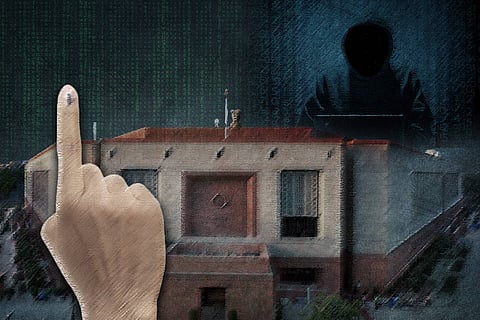

Several residents of the South Chennai Lok Sabha constituency in Tamil Nadu have reported that they have been receiving calls asking them to disclose who they would vote for, on Saturday, March 30. The Interactive Voice Response (IVR) call, which does not mention who is conducting the survey, asks respondents to disclose which candidate they support.
The IVR call asks respondents to press number one for Tamilachi Thangapandian who is representing the Dravida Munnetra Kazhagam (DMK) and is the sitting Member of Parliament, number two for Tamilisai Soundararajan from the Bharatiya Janata Party (BJP), number three for the All India Anna Dravida Munnetra Kazhagam (AIADMK) candidate Jayavardhan, number four for Tamil Selvi from Naam Tamilar Katchi (NTK) and number five for the others.
Some residents who received these calls alleged that if they failed to respond to the first call, they received calls from other similar numbers. TNM checked three such phone numbers on a caller identifying app and found they were all reported as election spam calls.
While it is common for opinion polls to be conducted ahead of elections through IVR, the problem with this IVR call stems from the fact that whoever is collecting information has failed to disclose their identity and the purpose behind collecting this information.
Yashwant Deshmukh, the Director and Founding Editor of CVoter, an international polling agency in Delhi, told TNM, “Any research exercise, regardless of mode of communication, be it face-to-face, Computer Assisted Telephone Interview (CATI), IVR or online, starts with the collecting party disclosing their identity. Not identifying themselves is unethical. They must also take the consent of the respondent, and only those who wish to participate in the exercise can be asked the survey questions.”
Srikanth L, a technologist tracking the government’s technology projects, said, “The practice of reaching out to voters for campaigning, surveys, booth slip delivery has been happening for a few years now, with no clear regulations around them. While such IVR survey calls might just be considered as spam by most, they pose the risk of mass disenfranchisement in subsequent elections.”
He added that voters’ data is widely available and isn’t difficult to collate. “With digital payments taking off across the state, it isn't difficult to collect and access this data across constituencies by anyone. It could be collated by any number of sources by any party, given the data leaks/ wide availability,” Srikanth said.
The issue was reported to the Media Certification and Monitoring Committee (MCMC), who work under the District Election Officer (DEO), an election official told TNM. Tamil Nadu will go to polls on April 19, in a single phase and the election results will be announced on June 4.